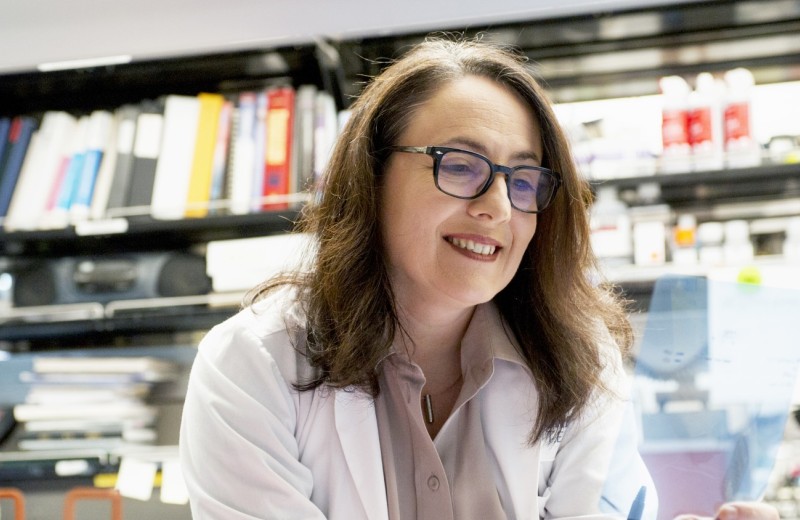Gladstone NOW: The Campaign Join Us on the Journey✕

Lennart Mucke, PhD, and his team receive funding to develop new drugs to reduce tau levels in the brain.
The US National Plan to Address Alzheimer’s Disease set an ambitious goal to prevent and treat the disease and related dementias by 2025. Scientists from around the country are working relentlessly to meet this objective and help the millions of people living with the disease.
One promising research target is a protein called tau, which is found abundantly in the brain and central nervous system. An abnormal buildup of this protein likely contributes to neurodegeneration and cognitive decline in Alzheimer’s disease and other neurodegenerative conditions.
However, tau hasn’t received as much attention as other proteins (such as amyloid-beta), particularly in terms of exploring new treatment avenues for Alzheimer’s disease.
To address this situation, a group of researchers at the Gladstone Institutes, led by Lennart Mucke, MD, established a highly innovative program in tau research. Their goals are to figure out how tau promotes neurodegeneration and cognitive decline and identify novel strategies to block its detrimental effects.
Mucke recently received the Alzheimer’s Innovation Award, jointly funded by the Alzheimer's Association and Johnson & Johnson Innovation, for one of his projects.
The project, which emerged from work supported by Cure Network Dolby Acceleration Partners, aims to discover and develop novel small molecule drugs that reduce overall levels of tau in the brain to prevent and slow the progression of Alzheimer’s disease and related conditions.
Mucke and his team have already demonstrated that lowering overall tau levels by 50 to 75 percent reduces cognitive deficits in mice and is well tolerated.
“Our findings indicate that lowering tau levels in the brain may be therapeutically effective in a range of devastating neurological diseases,” said Mucke, director of the Gladstone Institute of Neurological Disease. “The ultimate goal of our program is to develop pills that could treat and even prevent Alzheimer’s disease and related disorders known as tauopathies.”
Tauopathies are neurodegenerative disorders involving an accumulation of tau in the brain. They include some forms of frontotemporal dementia, as well as progressive supranuclear palsy (PSP), a movement disorder that can also affect mood and thinking.
Another important tauopathy is chronic traumatic encephalopathy (CTE), a neurodegenerative disease affecting people who have been exposed to repeated head trauma, such as professional football players and boxers.
The Alzheimer’s Innovation Award will help advance particularly critical components of Mucke’s ongoing drug discovery program to identify and optimize small molecule compounds that potently and safely reduce tau levels in the brain.
“We identified chemical compounds that have drug-like qualities and effectively lower tau levels in cultured brain cells,” explained Mucke, who is also a professor of neuroscience and neurology at UC San Francisco. “To turn them into real therapeutics for testing, we will now optimize their properties through medicinal chemistry, so they are stable in the body, enter the brain, and safely engage the correct target in this fragile organ.”
The researchers will then test their compounds in animal models to confirm that, upon chronic dosing, they are well tolerated and effectively lower tau levels in the brain. The final steps will be to test their capacity to reduce cognitive deficits and neuropathology in animal models of Alzheimer’s disease and, eventually, to test them in human clinical trials.
The Alzheimer’s Innovation Award supports cutting-edge concepts to develop new therapeutic agents that can progress to clinical treatment for Alzheimer’s disease and related dementias. Winners of this highly competitive award are selected through a rigorous, two-tiered review process. Mucke received the award during the 2017 Alzheimer’s Researcher Symposium held at Gladstone.
“Our receipt of this award is the result of exceptional teamwork,” said Mucke. “It reflects important contributions from many colleagues including Stephen Freedman, Daniel Kim, Joan McIntyre, Anke Meyer-Franke, and Matthew Turkheimer at Gladstone, collaborators at Evotec and AMRI, and our partners at Dolby Family Ventures.”
Gladstone’s Scientific Highlights of 2025
Gladstone’s Scientific Highlights of 2025
From fundamental insights to translational advances, here’s how Gladstone researchers moved science forward in 2025.
Gladstone Experts Alzheimer’s Disease Autoimmune Diseases COVID-19 Neurological Disease Genomic Immunology Cardiovascular Disease Data Science and Biotechnology Infectious Disease Conklin LabScience in Seconds | The Thinking Microscope: Research Powered by an AI Brain
Science in Seconds | The Thinking Microscope: Research Powered by an AI Brain
In this video, Steve Finkbeiner and Jeremy Linsley showcase Gladstone’s groundbreaking “thinking microscope”—an AI-powered system that can design, conduct, and analyze experiments autonomously to uncover new insights into diseases like Alzheimer’s, Parkinson’s, and ALS.
Gladstone Experts ALS Alzheimer’s Disease Parkinson’s Disease Neurological Disease Finkbeiner Lab AI Big DataKaterina Akassoglou Receives Zenith Fellows Award to Advance Alzheimer’s Research
Katerina Akassoglou Receives Zenith Fellows Award to Advance Alzheimer’s Research
Akassoglou has opened doors to understanding how the blood protein fibrin is involved in Alzheimer’s and other neurodegenerative diseases.
Awards News Release Alzheimer’s Disease Center for Neurovascular Brain Immunology Akassoglou Lab



